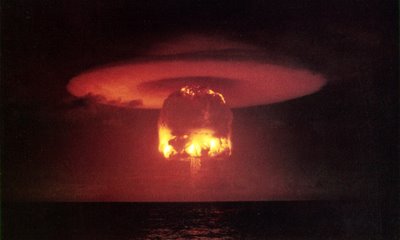However, the biggest difference between liberal and conservative thought on this issue is that, generally, liberals have been talking about the practical implications of Israeli policy while conservatives are defending Israel's moral imperative. I don't fault conservatives for this, but I do see a huge danger in the potential blind spots it causes. While I, as a liberal, see Israel's right to defend itself as a starting point for debate on the conflict, conservatives really seem to see it as the end. It's become the blanket justification for every action Israel takes and every action the Bush administration doesn't. Both liberals and conservatives in America want the Israeli people to be safe. Liberals have been standing alone, however, when the issue of safety is extended to Lebanon and couched in a strategy of ending the open warfare. As I said yesterday, I believe conservatives see a moral purity and expediency in war that makes them support it as the first and best option for dealing with intractable foreign policy problems. No amount of history seems to shake this certainty.
I don't believe for one minute that Israel is going to accomplish its goals by bombing Lebanon to pieces. Israeli leaders have repeatedly said they have no desire to occupy Lebanon again and Hezbollah really has no reason to lay down its arms. Israel's attacks on Lebanon are further destabilizing an already weak democracy and, as history has shown time and again, government instability is the best breeding ground for terrorism and authoritarian rule. Hezbollah has no incentive to disarm and neither Syria nor Iran have any incentive to isolate Hezbollah. Israel has effectively backed itself into a corner from which no escape route is a good option.
The only way forward for Israel that either marginalizes or stops Hezbollah altogether must involve multi-lateral talks with the other states in the region and international support for a strong, democratic Lebanon. Currently, Israel's punishment of Lebanon is weakening the government and alienating the people. For a few anecdotal examples, here are some quotes from the people of Lebanon, courtesy of Dahr Jamail of IPS News, via Alternet:
"Does our country not have the right to move forward like other democracies," says Nidal Mothman, a 35-year-old taxi driver in downtown Beirut. "We hate the American government for giving the green light for the Israelis to bomb us back to the stone age."
[...]
"How many Hezbollah have they killed," Mothman said. "Maybe just a few, while they've killed over 350 Lebanese civilians. What kind of war are they waging against my country?"
[...]
Foreign war ships are crowding ports as evacuation of foreign nationals continues. "Yes, we see the priorities of the western countries as they evacuate their people," 55-year-old clothing merchant in the Hamra district of Beirut, Ayad Harrar said. "So you see, screw the Lebanese, they do not matter to us. This is what their governments are saying to us by these actions."
Harrar said people are shocked that his country was once again plunged into war, just when they thought they had found peace.
"This afternoon it is calm, but we all know that when they finish evacuating their people, we will be bombed once more," Harrar said. "It is not possible to live a life while we live under these conditions; not knowing when our day to die is coming from more Israeli bombs."
The only hope of ending Hezbollah's influence in Lebanon is to convince the Lebanese to reject that influence, while giving the Lebanese the economic and military support they need to supplant Hezbollah's role. Hezbollah's style of entrenchment in southern Lebanon is not unlike a mafia protection racket. Hezbollah provides humanitarian services, political representation and, to a certain degree, at least the promise of armed protection, in exchange for political (and financial) clout and a civilian population to shield its activities. The only way to break this racket is to shift the hearts and minds of the Lebanese and provide them an alternative to Hezbollah's "protection". Thus far, Israel has managed to confirm exactly what Hezbollah is selling to the Lebanese Shia, while the United States has failed to step in and provide an alternative to the protection racket. Both nations have managed to further isolate the Lebanese and lend political justification to Hezbollah's anti-Western rhetoric. As an alternate path, perhaps negotiations with Syria and Iran could help de-fang Hezbollah, but the Bush administration has refused that as well. So nothing gets done while Lebanese and Israeli civilians die by the scores.
[I may have to change this blog's name to "Samurai Sam Yacking About The Middle East" pretty soon. I promise I'll find something else to pontificate upon soon. This issue has just really struck a chord with me... S. Sam]


